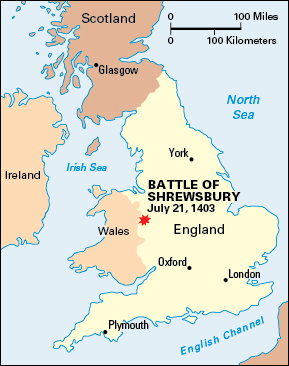Henry V (1387-1422) of England became king on March 21, 1413. He was the oldest son of Henry IV, of the House of Lancaster. Stern and ambitious, Henry V was known for his sense of justice and for his military leadership. He was often called the “warrior-king.”

As the Prince of Wales, Henry got early military training, helping to suppress rebellion against his father. In 1403, at age 16, he commanded part of the Royalist forces at the Battle of Shrewsbury. Henry received an arrow wound to the face yet pushed his troops on to victory. The young prince spent the next several years putting down a stubborn Welsh rebellion led by Owen Glendower. As his father’s health deteriorated, Prince Henry gained more control. By 1411, he was running much of the government.
As king, Henry V renewed the Hundred Years’ War with France, which had begun in 1337 during the reign of Edward III. Henry was determined to make good Edward’s claim to the French throne. In August 1415, Henry led an army across the English Channel, taking the French seaport of Harfleur. He then pushed into northern France, where a French army confronted him near the village of Agincourt on October 25. What followed was one of the most famous victories in English history. The English army had only about 6,000 troops. But its archers, firmly disciplined and supported by cavalry, routed a French army that probably consisted of about 20,000 to 30,000 troops. Over the next few years, Henry conquered Normandy, with the capital city of Rouen surrendering on Jan. 19, 1419. His military successes forced the French to agree to the Treaty of Troyes on May 21, 1420, making Henry heir to the French throne. He married Catherine of Valois, the daughter of King Charles VI of France, on June 2, 1420.
In 1421, Henry returned briefly to England before starting further military campaigns in France. He died suddenly, probably of dysentery, on Aug. 31, 1422, at Bois de Vincennes, outside Paris. Henry’s son and successor, Henry VI, failed in the huge task of preserving Henry’s gains in France. This failure helped lead to the overthrow of Henry VI and the House of Lancaster in 1461.
Henry V was born in 1387 in Monmouth, Wales, probably on August 9. He appears as Prince Hal in the English playwright William Shakespeare’s Henry IV, Parts I and II (1597-1598), and as king in the sequel, Henry V (1599). See also Agincourt, Battle of ; Glendower, Owen ; Henry IV ; Henry IV, Parts I and II ; Henry V ; Hundred Years’ War ; Shrewsbury, Battle of .
